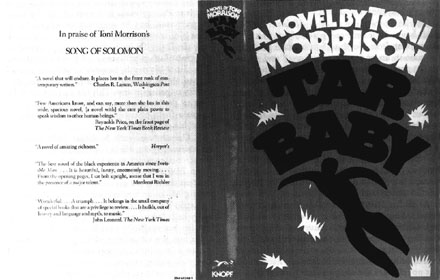

A novel of ideas, the work dramatizes the fact that complexion is a far more subtle issue than the simple polarization of black and white. Set on a lush Caribbean Island, Tar Baby explores the passionate love affair of Jadine, a Sorbonne-educated black model, and Son, a handsome knockabout with a strong aversion to white culture. According to Caplan, Morrison's concerns "are race, class, culture and the effects of late capitalism--heavy freight for any narrative.... She is attempting to stabilize complex visions of society--that is, to examine competitive ideas..." In a Dictionary of Literary Biography Yearbook essay, Elizabeth B. House outlines Tar Baby's major themes; namely, "the difficulty of settling conflicting claims between one's past and present and the destruction which abuse of power can bring. As Morrison examines these problems in Tar Baby, she suggests no easy way to understand what one's link to a heritage should be, nor does she offer infallible methods for dealing with power. Rather, with an astonishing insight and grace, she demonstrates the pervasiveness of such dilemmas and the degree to which they affect human beings, both black and white."
Tar Baby uncovers racial and sexual conflicts without offering solutions, but most critics agree that Morrison indicts all of her characters--black and white--for their thoughtless devaluations of others. New York Times Book Review correspondent John Irving claims: "What's so powerful, and subtle, about Miss Morrison's presentation of the tension between blacks and whites is that she conveys it almost entirely through the suspicions and prejudices of her black characters.... Miss Morrison uncovers all the stereotypical racial fears felt by whites and blacks alike. Like any ambitious writer, she's unafraid to employ these stereotypes--she embraces the representative qualities of her characters without embarrassment, then proceeds to make them individuals too." New Yorker essayist Susan Lardner praises Morrison for her "power to be absolutely persuasive against her own preferences, suspicions, and convictions, implied or plainly expressed," and Strouse likewise contends that the author "has produced that rare commodity, a truly public novel about the condition of society, examining the relations between blacks and whites, men and women, civilization and nature.... It wraps its messages in a highly potent love story." Irving suggests that Morrison's greatest accomplishment "is that she has raised her novel above the social realism that too many black novels and women's novels are trapped in. She has succeeded in writing about race and women symbolically."
From "Toni Morrison," Contemporary Authors, Gale Research, 1993.

Mail your comments to:
